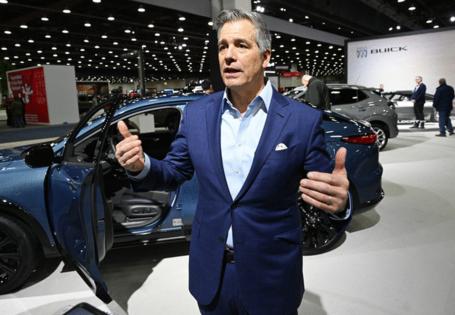Industry group calls out 'fractured' relationship between automakers and safety regulators
Published in Business News
WASHINGTON — The relationship between the auto industry and federal safety regulators is "fractured," the industry's top lobbying group said Wednesday in a filing to Congress.
John Bozzella, president and CEO of the Alliance for Automotive Innovation, called out the National Highway Traffic Safety Administration in written testimony to lawmakers ahead of a Thursday hearing.
"NHTSA may not always be mentioned alongside national security or international competitiveness — but it should be," he wrote. "Because its actions, or inaction, shape the trajectory of American automotive innovation. And today, the system is not working as intended."
The comments come at a moment of institutional upheaval in Washington as the Trump administration seeks to slash regulations across all areas of a sprawling federal bureaucracy. The sentiment of Bozzella's testimony, however, is hardly new for an industry that has resisted what it considers costly and overly prescriptive safety rules throughout its existence.
He continued: "The relationship between the industry and its chief safety regulator has become fractured. Innovation is being stymied. And as NHTSA struggles to modernize its standards and procedures, the risk grows that the U.S. will fall behind in the global race — ceding leadership to others."
Bozzella was not alone in criticizing NHTSA — for a variety of reasons — via written testimonies posted publicly on Wednesday. He and three other representatives of auto trade and safety groups are scheduled to testify in front of the U.S. House subcommittee on Commerce, Manufacturing and Trade.
David Harkey, president of the Insurance Institute for Highway Safety, wrote that NHTSA is "failing to meet the moment."
"In recent years, it has approached its job with a lack of urgency, using flawed methodologies that underestimate the safety benefits of obviously beneficial interventions," the IIHS president added.
He cited NHTSA's slowness to adopt regulations requiring antilock braking systems for motorcycles, which a 2022 IIHS analysis suggested would reduce fatal crash rates by about 22%.
"We first petitioned NHTSA to require motorcycle ABS in 2013. Ten years later, we submitted a new petition with updated evidence. To date, we have not received any response to either petition. In the meantime, the 27 member states of the European Union, the United Kingdom, Brazil, Japan, Taiwan, Australia, New Zealand and India have all mandated the life-saving technology," Harkey wrote.
It is unclear whether NHTSA will adopt such a rule under President Donald Trump, who signed an executive order in January calling for eliminating "10 regulations for each new regulation issued."
Harkey also called out NHTSA for "dragging its feet" on new, congressionally-mandated rules to prevent drunken driving. Catherine Chase, president of Advocates for Highway and Auto Safety, did the same in her written testimony.
"Until NHTSA completes this overdue rulemaking, lives will continue to be needlessly lost, injuries suffered and associated costs expended," she wrote.
Chase also called for more federal dollars for the agency: "Traffic fatalities continue to be a public health crisis, yet the funding for NHTSA’s lifesaving mission has fallen woefully short for more than four decades as costs and statutory responsibilities have increased."
NHTSA's budget for vehicle safety, according to Chase's testimony, was 71% lower in 2024 than in 1977 after accounting for inflation. In nominal terms, the budget went from $72 million to $110 million during that time.
The hearing witnesses also wrote to the committee about the need for modernization of autonomous vehicle policies, the New Car Assessment Program for vehicle safety, fuel economy standards and more.
Lawmakers are scheduled to hear from the witnesses at 10 a.m. Thursday.
©2025 www.detroitnews.com. Visit at detroitnews.com. Distributed by Tribune Content Agency, LLC.












Comments